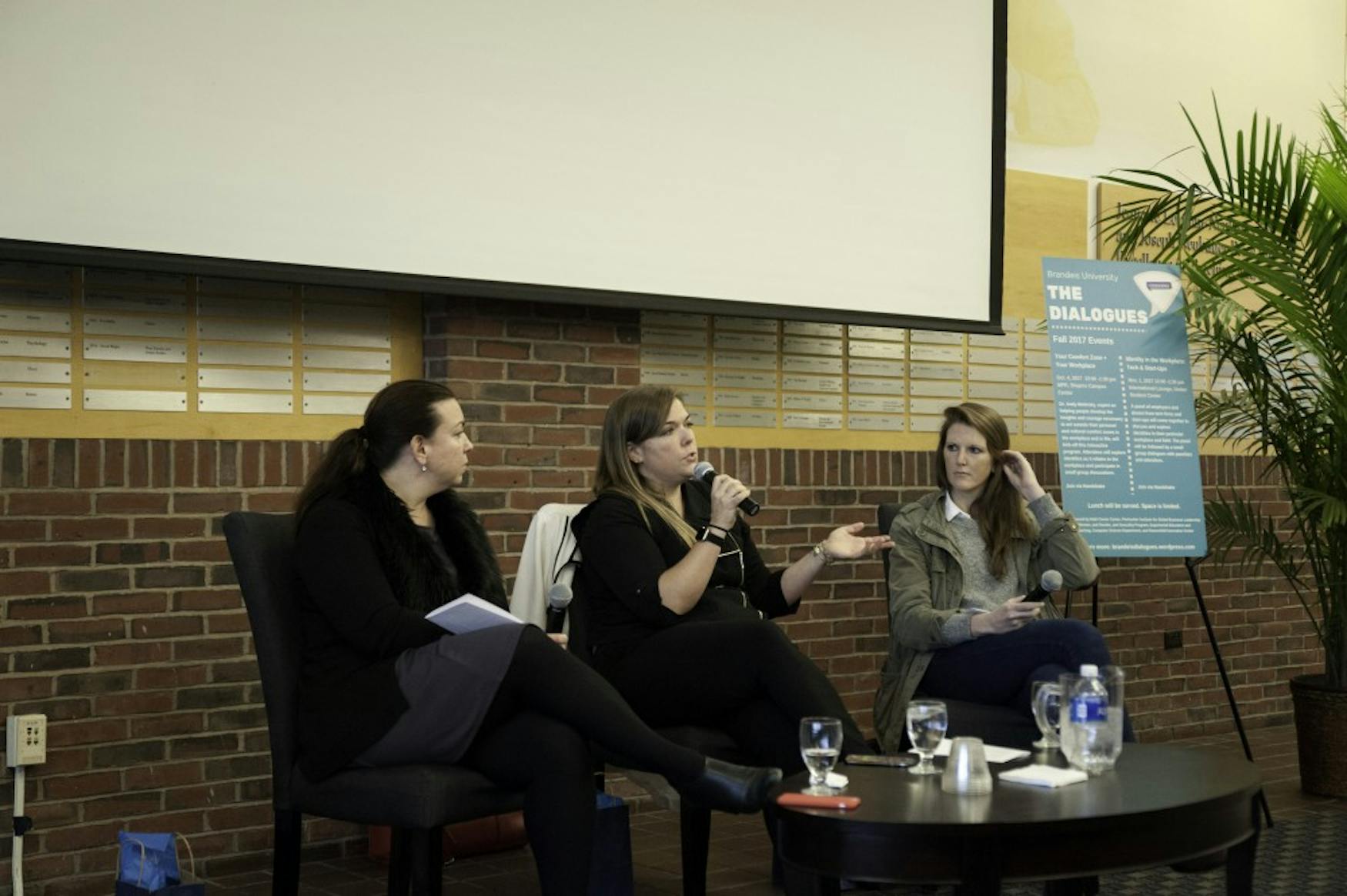Women tech professionals discuss workplace challenges
What can we do to ensure that everyone succeeds? Today, that question lies at the center of public controversy, debate and discussion. On Wednesday, “Identity in the Workplace: Tech and Startups” gave an answer.
Some fifty students, staff and faculty gathered in the Usdan Student Center for a panel discussion on the issues of gender and marginalization in business. This event constituted the second chapter in the ongoing Dialogues initiative, a program aimed at empowering career-driven students through discussion of identity and its role in the workplace.
This time, the conversation centered on specific ways to encourage women and improve their position in the professional world, in particular the burgeoning technology industry — a field that continues to marginalize them.
According to Cary Weir Lytle, assistant director of employer relations at the Hiatt Career Center and one of the event’s chief facilitators, the Dialogues forum arose out of student concerns with gender discrimination in industry and broader society.
He credited The Dialogues’ success to its unique and lateral approach to these issues. “Last year when the Dialogues first launched ... we noticed that almost all the events were packed. … This is really important [that] we’re creating these spaces, he said.
In keeping with the Dialogues’ mission to promote diversity, Lytle stressed the importance of providing women with the professional opportunities the business community has denied them for so long. “Brandeis is a majority women school,” he said. “We think about the proportion of women going into predominately male-dominated fields … and it’s not enough to say: ‘go network’ ... there’s a lot of forces at work.”
For Lytle, talk around professional inclusivity is not just theoretical; it affects marginalized groups on a daily basis. In the wake of the recent harassment allegations made against former Fox CEO Roger Ailes and movie mogul Harvey Weinstein and the systemic gender-based biases of Silicon Valley, he emphasized that honest conversations about gendered obstacles remain as relevant as ever. “We knew this was an important topic. There’s been a lot of things in the news,” noted Lytle, “So we said, ‘These are the conversations we need to have.’”
These conversations began with Wednesday’s event. Panelists included: Ally Yost, an associate at The Engine, a Venture Capital firm focused on empowering disruptive technologies with long-term capital; Lynne Zagami, head of customer success at Shoobx, a legal automation tool for other startups; and Ashley Lucas, director of Babson College’s WIN Lab ‘Accelerator’ program for female entrepreneurs.
Though each woman eventually found success, all three have encountered the problems of gender-based prejudice in their careers. Zagami started the conversation by relating her experiences as the first female member of Bright Leaf, a technology start-up. “I didn’t feel I was as much subject to some of the gender based issues that a lot of start-ups face,” she admitted.
Later though, Zagami realized through her interactions with other women in start-up fields that gender discrimination continued to be an issue, and she resolved to fight to allow women access to the same resources and opportunities afforded men.
“There are times where you really feel the gender imbalance in the start-up world, and I take the approach of I don’t really care if someone gets upset if I call it out,” she said of how time has affected her perspective.
On the subject of female participation in business and entrepreneurship, the panelists didn’t mince words. “It’s incredibly difficult and very lonely,” Lucas confessed. She mentioned the difficulty of pitching and co-ordinating business ideas in male dominated fields, due to the all-too-prevalent “Bro-culture” of the corporate sphere.
While more women have been able to break out in recent years, stark gender disparities continue to exist, Lucas said. Yost agreed, adding, “There aren’t a lot of women-led or minority companies getting funded.”
“Unconscious bias,” according to Yost, affects women too. She underscored the need for all to confront it and for women to “find cues when you are being biased unconsciously.”
The newfound attention to workplace discrimination can help to provide a catalyst for constructive change, Zagami said, adding that programs such as the Dialogues provided a much-needed venue for education, growth and understanding. For her, this spirit of personal and collective growth is integral to any lasting improvements for women and other marginalized groups in professional life.
Change, according to Zagami, can only arise through fellowship and mutual engagement. “Everybody needs to be helping everybody,” she said.
The panelists elaborated on how women can both fight these disadvantages and empower themselves. “I always feel like I sound incredibly negative when I’m up here and doing panels like this, because it is sort of this bleak landscape,” Lucas said. “But because of that, there is this huge, incredible community ... of these folks who are so dedicated to making sure you have the resources that you need in order to succeed.”
However, for Lucas, this process of empowerment must be a two-way street. “Always be that person who is willing to lend help,” she urged the audience.
After the official discussion ended, the organic ones began. Zagami, Lucas and Yost circulated through the audience, allowing attendees to become participants. Each table started its own exploration of the topics the panel raised.
For panel moderator Unee Washington, managing director of Asset Capital Solutions this bottom-up approach fulfilled the event’s central goal: inspiring those present to go forth and use what they have learned in life. “It’s ultimately believing in yourself,” she said. “We can heal and shift the paradigm.”
The event was co-sponsored by the Hiatt Career Center, International Business School, the Women, Gender and Sexuality Program, Experiential Learning and the Hassenfeld Innovation Center.
—Editor’s note: A prior version of this article incorrectly spelled Asset Capital Solutions and Shoobx. Additionally, the descriptions of The Engine and Shoobx have been clarified.




Please note All comments are eligible for publication in The Justice.